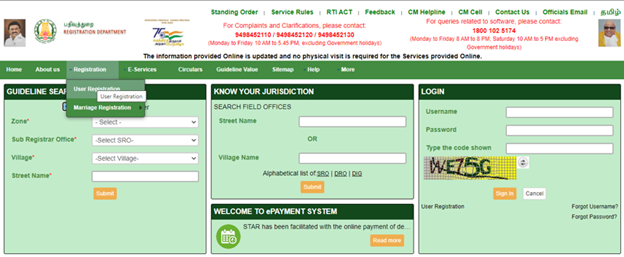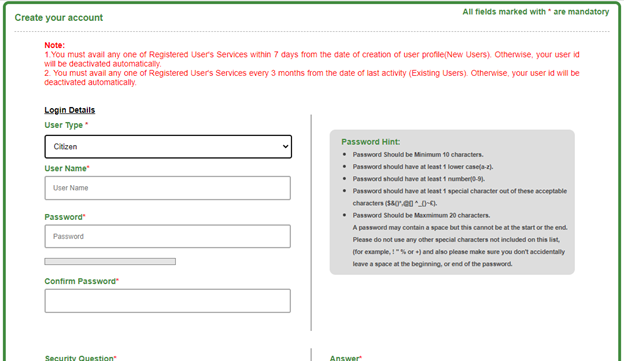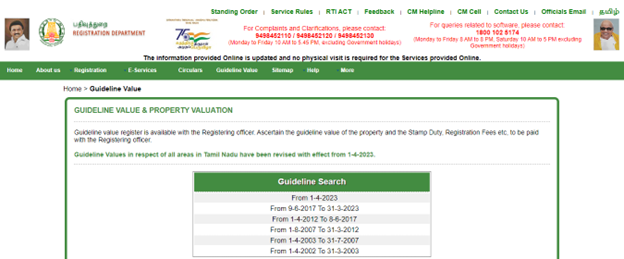Property buyers in Tamil Nadu must make it a point to check the encumbrance certificate before purchasing land in the state. In Tamil Nadu, the sub-registrar under whose jurisdiction the property falls, issues the encumbrance certificate. The property is registered at the Sub-registrar’s office, when it is purchased or sold.
An encumbrance certificate (EC) proves whether or not an entity, who is not the property’s original owner, has any control over it. For example, if a property is mortgaged with a bank, the encumbrance certificate would show that the said bank has an interest in it and the property is, thus, encumbered. The certificate is also known as a ‘villangam’ certificate in the state.
You can apply online for encumbrance certificate in Tamil Nadu by visiting the Inspector General of Registration (IGRS) Tamil Nadu or TNREGINET website. The portal was developed by the Government of Tamil Nadu, to ease registration for marriage, birth and death, firm, chit fund, etc. Services, such as search for encumbrance certificate and property valuation, can be accessed through the portal. To apply for an EC online, all you need to provide, is information such as your name, address, zone, district, SRO, street name, village, house details and appropriate extent and boundaries of the property, to submit the application form online. Here is a guide on how to get an encumbrance certificate online and the procedure for EC view online. The Registration Department to issue encumbrance certificates (EC) to business enterprises.
Encumbrance certificate: Quick facts
| Issued by | Sub-registrar office under the jurisdiction of which the property is located |
| Online application | IGRS Tamil Nadu portal https://tnreginet.gov.in/portal/ |
| Offline application | At Sub-registrar’s office |
| EC application fee | Re 1; Rs 15 for first-year information and Rs 5 for every subsequent year. |
| EC Validity | Up to 30 years |
| Types of Encumbrance Certificate | Form 15 and Form 16 |
What is encumbrance certificate?
An encumbrance certificate refers to a legal document issued by the sub-registrar under whose jurisdiction the property is located. It contains details about the property ownership, transactions, and related details. The encumbrance certificate or EC in Tamil Nadu is a valid proof to ascertain if an entity is the original property owner and helps prevent legal disputes. The EC is also required when purchasing or selling a property or applying for a home loan or loan against property.
Why is obtaining an encumbrance certificate important?
Obtain an encumbrance certificate is essential for those applying for loans against their properties/ home loans or planning to purchase or sell their properties. The certificate helps determine the legal title of the owner over the property. Further, having the certificate makes an individual eligible to get home loans, loan against property or advances from banks and financial institutions against the property. It establishes that the specified property is free of any economic or legal liabilities. Obtaining an EC is beneficial as it helps verify the legal status of a property and ascertain whether there are any legal claims or pending litigations against it. It makes property transactions easier and hassle-free.
An encumbrance certificate will be required in case of getting mutation of a property (Khata registration, Khata transfer/ patta). In case the required property or land tax is not paid for more than three years, the document is submitted to the village/ panchayat officer to replace the land tax records.
One may also be required to submit the EC for withdrawing PF for a property, purchasing or constructing a house.
EC online: How to get EC/ encumbrance certificate online in Tamil Nadu?
Step 1: To apply for an EC online, you will need to register yourself on the TNREGINET portal. If you already have an account, sign in, else sign up to login and access the services.

Step 2: If you are a first-time user, you will need to sign up and provide details such as username, password, address, identification number (PAN/Aadhaar/driving licence/others) and contact details. Complete the sign-up to receive an OTP on the contact number.
On signing up, you will receive the following screen:

Step 3: Check your email id for a verification link from the authority.

Step 4: Once your details are verified, you can sign in to the TNREGINET portal to proceed to view EC online and download the document..

Step 5: A registered user can now go to ‘E-services’ tab on the homepage > Encumbrance Certificate > Search and apply EC.
Step 6: You will be required to fill in the following details:
Location: Zone, district, sub-registrar office.
Time: EC Start date and EC end date.
Survey details: Village, survey number, subdivision number.
House details: Plot no, flat no, door no, ward, block, boundary details, extent and build-up area.
Additional details: Old survey no, TS no, old door no, declared owner, father’s name, any registered document.
Once you feed in these details, you can proceed to entering the captcha to search for the EC/encumbrance certificate Tamil Nadu.
Step 7: Once you click on ‘Search’, all the documents pertaining to the details you have entered will be displayed. Proceed to ‘Apply Online’.

Step 8: Enter your name, contact details and save it and proceed to pay.

Step 9: You can see the payment details, select the pay option to move to the e-payment screen.

Step 10: Enter the details in the e-payment section such as name, address, sub-registrar office etc.
Step 11: Choose the bank you wish to make the e-payment from and pay.

Step 12: Once your payment is successful, you will be provided with a bank reference number, CIN number and transaction ID. Keep these details handy. Upon selection of the applicable data and approval of the application by the sub-registrar, the encumbrance certificate will be sent to the applicant’s login with a QR code added in all the pages and a digital signature of the sub-registrar affixed in the end. An SMS notification will be sent to the applicant.

You can view the digitally signed online EC under ‘E-services’ > encumbrance certificate > Request List.
See also: How to obtain Patta online in TN
How to get TN EC encumbrance certificate offline?
- Visit the sub registrar’s office where the property is registered and submit an application along with the relevant documents. For the villangam online certificate application, you can download the application format here.
- The authority concerned will review all documents to ascertain its legality.
- An EC with details of all transactions or in the absence of transactions, a Nil Encumbrance Certificate is issued. This may take 15-30 days from the date of application.
- Pay the requisite fee applicable for the TN EC related online service.
- After the application is submitted is successfully, an acknowledgement number or reference number will be issued. Applicants must save this number for future reference and use it to track their application status.
Documents required
- Attested copy of address proof
- Details about property
- Title details
Encumbrance certificate application format
Applicants are required to submit a simple formula proforma seeking assistance in the application process for an encumbrance certificate. The letter must be addressed to – The Registrar/Sub-registrar, Registrar/Sub-registrar office and Address.
The applicant must include property details, including complete address as specified in the registration deed, including east, west, south, or north boundaries to identify neighbouring properties or landmark. The officer concerned may help you in case you do not have complete property details.
Encumbrance certificate sample format
| From
(Applicant Name, and contact details) To, The Registrar (Sub-registrar) Register (Sub-register) office, Address Dear Sir / Madam, Sub: Application for Encumbrance Certificate (EC) of the property I would like to apply for the Encumbrance Certificate (EC) for the following house property. (Property details, including complete address as specified in the registration deed, measurement including east, west, south and north with identification of nearby properties). I have duly filled the EC application form, letter and paid the requisite fees as per the guidelines. Kindly process the above detailed EC and furnish an original copy of the certificate. Thanking you, Yours Truly, (Name and contact details) |
How to search Tamil Nadu encumbrance certificate online on TNREGINET
Step 1: Visit the official website of the TNREGINET/ Inspector General of Registration (IGRS) Tamil Nadu.

Step 2: At the bottom of the page, you will see various services, opt for ‘ENCUMBRANCE CERTIFICATE’. Click on it to apply for an EC online. You can also tap on the ‘e-services’ tab on the home page to be directed to the same window.

Step 3: You will be directed to the page where you will have to feed in details such as zone, district, sub-registrar office, EC start and end date, survey details such as village, survey number and subdivision number. Enter the captcha to confirm and search for your EC/ Villangam certificate.

Step 4: You can also choose to opt for the ‘document-wise’ option on the above screen. You will be asked for details such as sub-registrar office, document number, year and document type. Proceed after entering the captcha.

If you wish to know the data availability period for an encumbrance certificate or villangam certificate in Tamil Nadu, click here.
Also read about TNREGINET guideline value
How to view Encumbrance Certificate online in Tamil Nadu?
- Step1: For EC view online, visit the official TNREGINET portal.
- Step2: You can click on ‘Search/View EC’ tab under the ‘Encumbrance Certificate’ given at the bottom of the home page. Alternatively, you can click on the ‘E-Services’ tab and then on the ‘Encumbrance Certificate. Then, you need to click on ‘View EC’.
- Step 3: You will be required information by putting tick mark on ‘EC’, ‘Document-wise’ or ‘Plot-wise’. Then type-in the CAPTCHA and then click on ‘Search’. Now, you will be able to view TN EC online.

States that issue encumbrance certificate
Encumbrance certificates are mainly issued physically across India, except a few states. The states where EC online services are available include Andhra Pradesh, Kerala, Odisha, Puducherry, Tamil Nadu, and Telangana.
How long is EC certificate valid?
One can obtain an encumbrance certificate of a property for a period of up to 30 years. One must note that an EC requested for a specified period will have details only for that period.
When is an encumbrance certificate needed?
The term encumbrance relates to any financial or non-financial claims over a property other than the titleholder of the said property.
When buying a property, a buyer must ensure that the property has a clear title. Obtaining the Encumbrance Certificate will help in verifying if the property one is looking to purchase is free from any legal or monetary liabilities such as liens, outstanding loan, etc. If there is a charge on the EC, it is necessary to rectify it before going ahead with the purchase. A prospective buyer can ascertain if there are any existing owners who can claim legal rights over the property.
Further, the EC is a crucial document lending institutions may ask for during loan against property and home loan applications.
Additionally, one may need EC documents for mutation of property (Khata Registration/ Khata Transfer / Patta). In case of non-payment of property or land taxes for more than three years, the certificates are shared with the Village / Panchayat Officer to replace the land tax records.
Encumbrance Certificates may be needed for other purposes such as the sale of the property, withdrawal of PF for a property, home construction, purchase, etc.
Types of encumbrance certificates
The encumbrance certificates are of two types, namely Form 15 and Form 16. The Form 15 document is issued by the Sub-registrar’s office if the property has any encumbrances during the period for which an applicant has requested for the certificate. On the other hand, the Sub-registrar’s office issues a nil-encumbrance certificate on Form 16 if a property has not recorded any encumbrances during the time for which the application has made a request.
Difference between encumbrance certificate vs non-encumbrance certificate
| Encumbrance certificate | Non-encumbrance certificate |
| EC, issued on Form 15, includes details related to the pattern of inheritance of the land, if any, sale and purchase details, leases on it and mortgage-related data, etc. | Non-Encumbrance Certificate, issued on Form 16, mentions that there are no mortgages of any property, thus no one can claim ownership. |
| It takes around 15 to 30 days to receive the certificate | It takes around 20 to 30 days to receive the certificate |
Difference between EC, OC and CC
| Encumbrance Certificate (EC) | Occupancy Certificate (OC) | Completion Certificate (CC) |
| The EC document mentions that no other party except the owner can claim ownership of the property for any reason. | An occupancy certificate is a document that states the local bodies do not have any objection if the building project is used for habitation purposes. | A completion certificate refers to a document that certifies that the property is now completed and construction has been carried out as per the guidelines issued by the local authorities. |
How to get EC Form 15 online in Tamil Nadu?
EC Form 15 is not issued online. To obtain Form 15 document, one must visit the sub-registrar office and submit an application known as Form 22. The applicant must provide relevant details such as owner’s name, property details, etc. Payment of Rs 10 as the application fee must be made. The Form 15 EC will be issued within two days.
What is the non-encumbrance certificate in Tamil Nadu?
In Tamil Nadu, a non-encumbrance certificate is issued when there are no transactions in respect of the property within the time period for which Encumbrance Certificate is required. This is also known by the name of Nil Encumbrance Certificate.
Importance of non-encumbrance certificate
When purchasing or selling any property, one should ensure the property is free of any financial debt. In case a loan was earlier sanctioned against the property or it was mortgaged to a lender, it must be cleared and free title should be established before one applies for a new loan. A non-encumbrance certificate is an essential document that must be submitted to the lending institution along with other documents when applying for a loan. If a transaction is done without getting a non-encumbrance certificate, it can lead to legal and financial disputes. Non-EC charges may vary from state to state and it is computed based on the property size, duration for which the certificate is applied for, etc. The non-EC application fee varies from Re 1 to Rs 200.
What is a nil encumbrance certificate?
If there have been no transactions pertaining to the said property, during a certain period for which an encumbrance certificate is sought for, then, a nil-encumbrance certificate will be issued.
How to obtain a digitally signed copy of the Encumbrance Certificate in Tamil Nadu?
The procedure for obtaining a digitally signed copy of Encumbrance Certificate in Tamil Nadu has been made simple. For that, login to the www.tnreginet.com portal, then go to ‘E-services’ drop down menu. Select ‘Encumbrance Certificate’ and then click on ‘Search and Apply EC’. However, for that you will have to create and ID and login to the www.tnreginet portal again and carry out the same procedure as above. Now make payment for EC through the online payment gateway. The digitally signed online EC will be ready to be downloaded from the ‘Request List’ tab in the same menu. The fee obtaining digitally signed EC is as under:
- EC Application fee- Re 1.
- Search Fees for 1St year – Rs. 15
- Search fees for every subsequent year – Rs 5
- Additional Fee in the Computerised period, that is, from 1987 onwards – Rs 100
EC online: What is the application fee?
| State | Encumbrance certificate fee |
| Tamil Nadu | Application fee of Re 1. A fee of Rs 15 for first-year information and Rs 5 for every extra year. |
| Telangana | A fee of Rs 200 for 30 years information and Rs 500 for more than 30 years. Additional service charge of Rs 25. |
| Andhra Pradesh | Rs 300 for information up to 30 years and Rs 500 for information more than 30 years |
| Delhi | Request fee of Rs 200 onwards, depending on the locality and years for which you ask. |
| Kerala | Single search and copy for Rs 10; Extra sheets (over first 2 sheets used) – Rs 10 per sheet (as on March 31, 2018) |
The application fee for an encumbrance certificate (EC) will depend on the property’s location and the state government. The applicable charges for obtaining an EC in some popular states are mentioned above.
What is the online payment method?
- Login in to the official portal https://tnreginet.gov.in.
- Generate NEFT / RTGS challan available under the e-payment option.
- Fill up the required charges.
- Select the SBI payment gateway. Then, opt for NEFT or RTGS option.
- Print NEFT / RTGS payment challan and pay in any bank using this challan, except SBI.
- Go to the login and print acknowledgement.
What is the offline payment method?
The offline payment method includes paying the fees at bank branches in person. One can pay using offline challan, login to the portal and go to e-payment. Fill up the required charges. Select the offline payment method. Create offline payment challan and pay at any bank branch using this challan. Go to the login page and verify the payment status.
Users must avoid paying through common payment slip available in bank branches – State Bank of India, Indian Overseas Bank, Indian Bank, IDBI Bank, Central Bank of India, Punjab National Bank, Bank of Baroda and Union Bank of India.
How to track encumbrance certificate status?
The process to track the status of the EC application varies, depending on the website of the state. Most government websites allow citizens to apply for an Encumbrance Certificate online and easily track the application status.
In Tamil Nadu, one can check the EC payment status from the TNREGINET portal by following the path E-services-> E-Payment-> Payment-> Payment status.
In the official Website of the Kerala Government, the steps are as follows:
- Select EC Status under the Encumbrance Certificate option in the Certificate menu.
- Provide the Transaction ID allotted at the time of application.
- Enter the captcha. Click on Check Status. The certificate can be downloaded.
How to correct an encumbrance certificate in Tamil Nadu
One should always be careful while applying for an encumbrance certificate in Tamil Nadu. Users applying for online EC or encumbrance certificate in Chennai and other cities need to be aware of the rectification deed. In case you have any mistake in your certificate, you need to apply for a rectification deed along with any proof to show the presence of errors in the previous encumbrance certificate. The changes that can be made to an encumbrance certificate will only be clerical in nature and no major changes can be made. The documents submitted at the sub-registrar’s office cannot be changed. As a result, any mistake in the original documents cannot be rectified through a rectification deed.
Limitations of Encumbrance Certificate In Tamil Nadu
Encumbrance Certificate in Tamil Nadu comprises details of only the period that has been requested for. Any details prior to this period do not get reflected in an encumbrance certificate. Similarly, any oral agreement or unregistered documents are also not reflected in an Encumbrance Certificate Tamil Nadu.
Also read about Stamp duty and property registration fees in Tamil Nadu
Online encumbrance certificate: How to download the Villangam certificate?
- To download the Villangam certificate, log in to the official TNREGINET portal encumbrance certificate option.
- Click on Encumbrance Certificate under E-Services tab and then click on ‘View EC’ option.
- Provide the details to generate the encumbrance certificate. You will be able to download the Villangam certificate.
E-signed encumbrance and certified copies in Tamil Nadu
The state government has given its sanction for e-signed encumbrance and certified copies in the state. The move will be a step towards modernisation of the existing system. The entire onus of enabling and facilitating this move is on the sub-registrars.
Those seeking encumbrance certificates and certified copies will be provided with a QR-enabled copy with the digital signatures of the respective sub-registrars. The Aadhaar linked e-sign can be utilised by any official with the password. Once the sub-registrar’s thumb impression is placed on the biometric system, the system will automatically recognise the Aadhaar number of the sub-registrar and his/her digital signature would be encrypted in the certificates.
How to download encumbrance certificate in Tamil Nadu?
- Visit the official portal of the Tamil Nadu registration department.
- Follow the process of online EC view through the TNREGINET portal.
- Click on the encumbrance certificate option and choose the view or download the encumbrance certificate.
- Then, you can download the Villangam certificate. It is also accessible through the QR code given to you on your registered contact number/email once the certificate is ready.
How to update an encumbrance certificate (EC)?
| Steps | Documents required |
| Verify property ownership | Property Deed, NOC |
| Check for liabilities | Property tax receipts and other proofs |
| Check for legal liabilities | Details of ongoing legal disputes |
| Get the latest EC | EC application form – duly filled |
| Update transaction history | Updated EC showing latest details |
Before proceeding with a property-related transaction, make sure you have the updated EC copy. Otherwise, it can create legal disputes or claims against the property. First, verify the ownership of the property to ensure all taxes and liabilities have been settled. Find out if there are any legal disputes related to this property, which can affect the property title. After verifying these details, approach the relevant authority (sub-registrar’s office) to get the latest EC copy with the update details regarding property’s transaction history.
Court litigations to be seen in EC
In what is being called a rare ruling in 2020, the Madras High Court has said that prospective buyers and interested parties should be able to see court rulings in the EC. Justice N Anand Venkatesh stated this given that, so far, buyers had to approach civil courts, to remove disputed entries in the jurisdictional civil courts. There was no provision in the Registration Act by which officials could cancel any document or any entry made in property records.
How long does it take to get Villangam or encumbrance certificate in Tamil Nadu?
- One can get an encumbrance certificate within two to three days if one applied for the encumbrance certificate online.
- It can take two to four weeks if one has applied for an encumbrance certificate offline.
How to apply for any TNREGINET document?
Visit the official portal https://tnreginet.gov.in/portal/ to apply for any TNREGINET document online. Complete the online application form and upload all the relevant documents such as a passport or certificate of education. If you are not able to apply for any service online, you can contact on the official email or number given on the website.
Tnreginet: User registration
Before applying for an EC online in Tamil Nadu, one must register on the official TNREGINET website.
- Visit the website https://tnreginet.gov.in/portal/ and click on User Registration option given under the ‘Registration’ tab.

- Complete the registration form by providing relevant details.

New users should avail any one of the registered user’s services on TNREGINET within seven days from the date of creation of the user profile. Otherwise, the user ID will get deactivated. Existing users should avail any one of the registered user’s services every three months from the date of the last activity on TNREGINET deactivation of their User ID.
EC online Tamil Nadu: How to add more properties in a single document?
Users have the option to add more properties in a single document. For this, visit the official portal https://tnreginet.gov.in/portal/. Choose the ‘Add’ option to include ‘N’ number of properties to proceed.
What is EC transfer?
An encumbrance certificate is a vital document that one can obtain when buying land or property as it is proof of ownership. The document is essential for verifying whether or not the property/land is free of tax dues or any legal or financial issues. It also clarifies if there is any encumbrance on the property by the government for any statutory dues. Thus, EC is also required when transferring property.
Why is EC taken for 30 years?
One can obtain an Encumbrance Certificate of a property for up to 30 years. The EC for a specific period will include all records of developments related to the property during this period. This is also helpful in verifying property when applying for home loans.
How can I check my land guideline value in Tamil Nadu?
One can visit the official website of the Tamil Nadu Registration Department TNREGINET to check the guideline value for various districts.
- One the home page of the TNREGINET portal, click on Guideline Value.
- Then, click on the relevant link under Guideline Search.

- A new page will open. You can view guideline value for Street or Survey number. Choose the relevant option. Next, choose to search Village wise or Category wise. Then, select the Zone, Sub registrar office, registration village, land category from the drop down.
- Click on Search to proceed.
EC online Tamil Nadu: Contact information
Citizens can write to the following email address: [email protected]
Telephone number: 044-24640160
Or at No.100, Santhome High Road, Chennai-600028, Tamil Nadu, India
FAQs
A CC or Completion Certificate is issued by the local authority to a builder or developer, upon the completion of construction of a building in compliance with the building rules and plans. An EC establishes the ownership and financial liability attached to the property, if any.
In case you want to apply for an encumbrance certificate offline, you can use Form 22 to make the application.
To view Tn EC online payment status, visit the TNREGINET website and go to E-services > E-Payment > Payment > Payment status.
According to the Standing Order 979 (ii) in respect of the offices and period, which is not computerised, the encumbrance certificate shall be completed within four days from the date of admission of application. In case of computerised period, the EC will be issued immediately.
Encumbrance certificate in the state of Tamil Nadu costs Re 1 for the first year and Rs 15 for any information. The computerised encumbrance certificates cost Rs 100.
When there are no transactions during a certain period, a Nil-encumbrance certificate is generated for the individual.
An Encumbrance Certificate (EC) is an important document that is required during purchase or sale of a property and also when applying for home loans or loan against property.
Property owners in Chennai can sign into the TNREGINET portal to apply for an Encumbrance Certificate (EC) online.
A Villangam Certificate or Encumbrance Certificate can be checked only if it has been applied for through offline method because applying through online method will provide the Encumbrance Certificate immediately. In the offline method of applying, after you have submitted your Encumbrance Certificate application and made all the payments, you will get status updates on the registered mobile number.
The Villangam certificate or the Encumbrance Certificate that has been received by an applicant, either through offline method or online mode, is a verified certificate. One does not need to take further action to verify Encumbrance Certificate. How is EC different from CC?
What is Form 22 used for?
Where can I check the transaction status for the e-payment?
Is there any time limit for getting the encumbrance certificate?
What is the cost of an encumbrance certificate?
What happens when there are no transactions?
Is EC required for home loan?
How can I get EC for apartment in Chennai?
How to check Villangam certificate/ Encumbrance Certificate status?
How to verify Encumbrance Certificate in Tamil Nadu?
Can I obtain registration details from sub-registrar’s office directly?
Yes. Citizens can approach the sub-registrar office and obtain registration details.
What does market value in encumbrance certificate mean?
Market value in an encumbrance certificate refers to the predicted price for the property one expects when selling it.
Who all are considered as family when availing stamp duty rebate?
The Stamp Act defines family as one which comprises of father, mother, husband, wife, son, daughter, brothers, sisters, and grandchild. The stamp duty fee for Settlement, Release, Partition, and other such instruments, for family members is 1%, maximum of Rs.25,000. The registration charges is also 1% subject, maximum of Rs 4,000.
How can I get an encumbrance certificate in Andhra Pradesh?
One can get an EC online in Andhra Pradesh by visiting the official AP stamps and registration portal of http://registration.ap.gov.in/.
How can I get an encumbrance certificate in Maharashtra?
One must apply for the encumbrance certificate in Maharashtra through offline mode by visiting the respective Sub Registrar's office. However, the official portal for land registration of the Government of Maharashtra provides the facility to download the EC online.
Can I edit the Abstract for Draft Creation document?
Yes. There is an option to edit Abstract for Draft Creation document. However, one can edit the Abstract for Draft Creation document before it is processed in the back office.
When is an encumbrance certificate needed?
You would require an encumbrance certificate when you are purchasing a property, taking a home loan or withdrawing money from provident fund to purchase a house. The EC is also required for property mutation and sale of the property.
Is EC free?
A nominal charge is applicable, which may vary from one state to another.
Can you get an encumbrance certificate after buying a house?
An encumbrance certificate can be obtained after buying a house. It ensures the property owner’s name has been recorded by SRO. Applying for it earlier helps identify any owner and claim the property's legal title.
Do all transactions reflect in an EC online?
An EC will contain details of transactions only for a specified period of time if it has been registered with the Registrar’s office.
| Got any questions or point of view on our article? We would love to hear from you. Write to our Editor-in-Chief Jhumur Ghosh at [email protected] |
(With inputs from Sneha Sharon Mammen)
Harini is a content management professional with over 12 years of experience. She has contributed articles for various domains, including real estate, finance, health and travel insurance and e-governance. She has in-depth experience in writing well-researched articles on property trends, infrastructure, taxation, real estate projects and related topics. A Bachelor of Science with Honours in Physics, Harini prefers reading motivational books and keeping abreast of the latest developments in the real estate sector.












